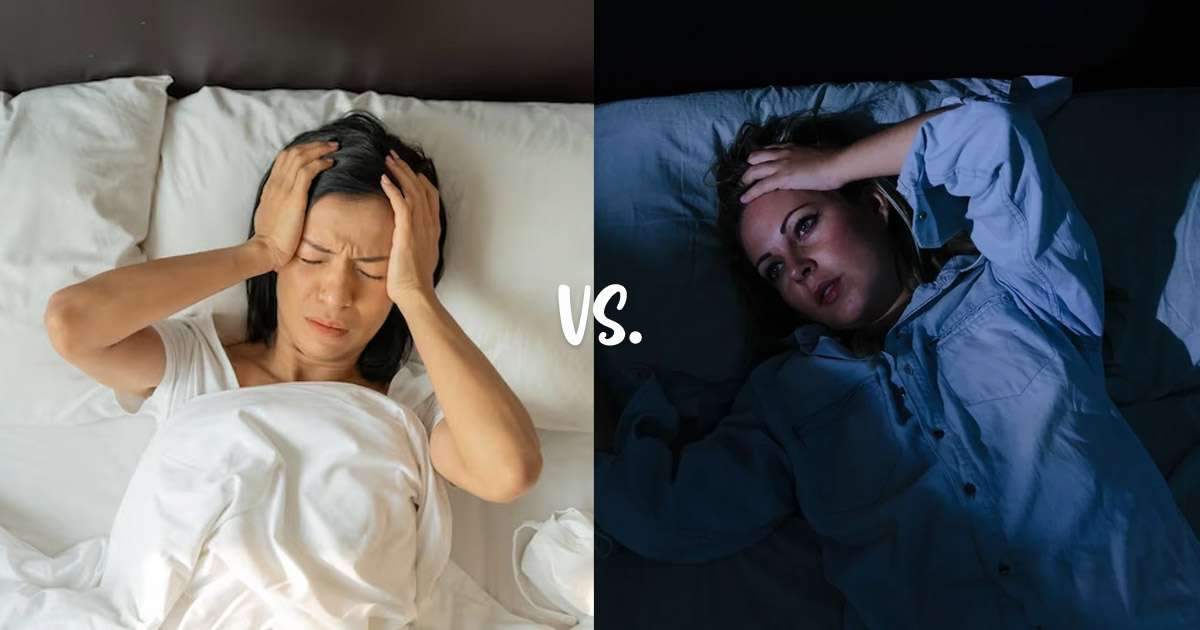Hypersomnia vs. Insomnia: The Differences of These Two Sleep Disorders

Sleep disorders can profoundly impact our daily lives, affecting everything from our mood and cognitive function to our overall health. Hypersomnia and insomnia are two common sleep disorders that present contrasting challenges when it comes to sleep patterns and their effects on individuals.
Symptoms of Insomnia vs. Hypersomnia
Insomnia and hypersomnia manifest with distinct sets of symptoms, each impacting sleep in different ways:
Insomnia: Insomnia refers to difficulty falling asleep, staying asleep, or waking up too early and not being able to go back to sleep. Individuals with insomnia often experience:
- Difficulty initiating sleep despite feeling tired
- Waking up frequently during the night and struggling to fall back asleep
- Feeling unrefreshed or unrested after sleep
- Daytime impairments such as fatigue, irritability, and difficulty concentrating
Hypersomnia: Hypersomnia involves excessive daytime sleepiness despite getting adequate or even prolonged nighttime sleep. Symptoms of hypersomnia include:
- Excessive daytime sleepiness, where individuals may struggle to stay awake during the day
- Prolonged nighttime sleep, often exceeding 10 hours per night
- Difficulty waking up from sleep, experiencing sleep inertia or grogginess upon awakening
- Frequent daytime napping, which doesn’t alleviate feelings of sleepiness,
Long-Term Effects of Insomnia and Hypersomnia
Both insomnia and hypersomnia can lead to significant long-term health consequences if left untreated:
Insomnia: Chronic insomnia is associated with several health risks and impairments, including:
- Increased risk of developing or worsening mental health conditions such as depression and anxiety disorders
- Cognitive impairment, affecting memory, attention, and decision-making abilities
- Higher susceptibility to accidents and injuries due to impaired motor coordination and cognitive function
- Negative impact on overall quality of life, productivity, and interpersonal relationships
Hypersomnia: Chronic hypersomnia can similarly impact health and well-being, contributing to:
- Persistent fatigue and low energy levels throughout the day
- Impaired cognitive function, including difficulties with memory and concentration
- Increased risk of obesity and metabolic disorders due to disrupted sleep-wake cycles and altered appetite regulation
- Reduced productivity and impaired social functioning due to excessive daytime sleepiness
Treatment Options of Hypersomnia vs. Insomnia
Effective management of sleep disorders requires tailored treatment approaches designed to address specific symptoms and underlying causes:
Insomnia:
Cognitive Behavioral Therapy for Insomnia (CBT-I)
CBT-I is a structured program that helps individuals identify and change thoughts and behaviors that contribute to sleep problems. It focuses on improving sleep hygiene, relaxation techniques, and stimulus control.
It involves techniques such as identifying and changing negative thoughts about sleep, improving sleep hygiene practices, and implementing relaxation strategies. CBT-I aims to promote better sleep quality and restore healthy sleep patterns without the use of medication.
Medications
Prescription sleep medications may be prescribed in the short-term to help manage insomnia symptoms. These medications include benzodiazepines, non-benzodiazepine hypnotics, and melatonin receptor agonists.
- Benzodiazepines: These medications act as sedatives and may help induce sleep, but they are typically prescribed for short periods due to potential for dependence.
- Non-Benzodiazepine Hypnotics: These newer medications act similarly to benzodiazepines but often have a shorter half-life, reducing the risk of next-day sedation.
- Melatonin Receptor Agonists: These medications mimic the effects of melatonin, a hormone that regulates sleep-wake cycles, and are used to promote sleep onset and maintenance.
Lifestyle Changes
Adopting healthy sleep habits such as maintaining a regular sleep schedule, creating a relaxing bedtime routine, limiting caffeine and alcohol intake, and creating a comfortable sleep environment.
- Maintaining a consistent sleep schedule by going to bed and waking up at the same time every day, even on weekends,.
- Creating a relaxing bedtime routine that signals to the body that it’s time to wind down, such as reading or taking a warm bath,.
- Avoiding stimulants like caffeine and nicotine close to bedtime, and limiting alcohol intake, which can disrupt sleep patterns,.
- Ensuring the sleep environment is conducive to sleep, with a comfortable pillow and mattress, adequate room temperature, and minimal noise and light.
Hypersomnia:
Stimulant Medications
Stimulant medications such as modafinil or armodafinil may be prescribed to promote wakefulness and reduce excessive daytime sleepiness. These medications stimulate the central nervous system and can help improve alertness and cognitive function during waking hours.
Behavioral Therapies
Cognitive behavioral therapy for hypersomnia (CBT-H) focuses on improving sleep hygiene, regulating sleep-wake cycles, and managing daytime napping behaviors. CBT-H focuses on improving sleep hygiene practices specific to hypersomnia, such as regulating sleep-wake cycles and addressing behaviors that contribute to excessive daytime sleepiness. Techniques may include scheduled napping to prevent sleep inertia and maintaining a consistent sleep schedule.
Managing Underlying Conditions
Treating medical or neurological conditions that contribute to hypersomnia, such as sleep apnea, narcolepsy, or depression, can help alleviate symptoms of excessive daytime sleepiness. Identifying and treating underlying medical or neurological conditions that contribute to hypersomnia is essential:
- Sleep Disorders: Conditions such as sleep apnea or narcolepsy may require specific treatments, such as continuous positive airway pressure (CPAP) therapy for sleep apnea or medications for narcolepsy.
- Mental Health Disorders: Addressing coexisting conditions like depression or anxiety through therapy or medication can also improve symptoms of hypersomnia.
- Medication Side Effects: Adjusting medications that contribute to daytime sleepiness can help manage symptoms effectively.
Understanding Sleep Disorders for Better Health
Knowing the differences between hypersomnia and insomnia is crucial for effective diagnosis and treatment. Whether struggling with difficulty initiating sleep or battling excessive daytime sleepiness, seeking timely intervention and adopting healthy sleep habits can significantly improve overall well-being. By addressing these sleep disorders with appropriate medical guidance and lifestyle adjustments, individuals can enhance their quality of life and ensure better sleep health.

